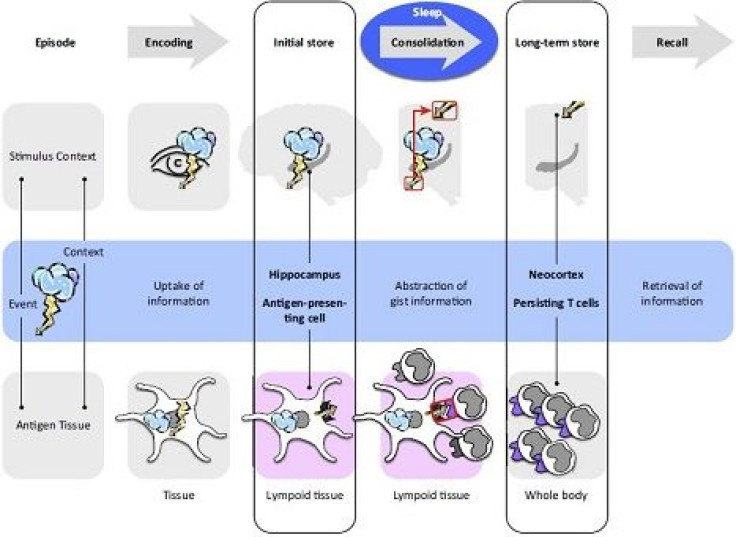Your Immune System, Just Like Your Brain, Needs Sleep To Create Memories

Sleep helps you transform remembered facts and experiences from the day into long-term memories stored within your brain. But could nightly slumber benefit your immune system as well? Researchers at the University of Tübingen say this may be the case, proposing deep sleep strengthens our immunological “memories” of viruses and bacteria to help our bodies recognize infections.
This “holistic concept of sleep” suggests “long-term memory formation is an integral function of [sleep] that, beyond serving the brain, captures very different organismic systems,” wrote the researchers in their published opinion.
Three Steps on the Road to Recollection
We humans are capable of both remembering and forgetting. We carry what matters most from the burning house of our past, we take only what is necessary into the future. From childhood, we remember the burning temperature of the radiator, the bully who threw a stone. While the underlying reason for memory is well-known, the practice of remembering is more mysterious. Still, scientists are able to divide memory into three distinct processes, as described by the German researchers.
Encoding refers to how our brain takes up information (a possible memory) and then stores a representation of this within our brain cells. Following this, consolidation occurs; here our brains transform these encoded representations, initially fragile and prone to decay, into more stable, longer-lasting cellular representations. Finally, recall occurs when we reactivate stored memories in order to respond to some environmental context or feature.
More specifically, our brains encode the fragile, cellular representations in the circuitry of the hippocampus and then transfer these to the neocortex and striatum where they are stored (consolidation).
“For the purpose of comparison, we propose a subdivision of immunological memory formation — paralleling psychological memory formation— into the processes of encoding, consolidation, and recall,” wrote the authors.

The immune system process works like this, according to the researchers:
Encountering a bacterium or virus, the immune system collects fragments of the infectious bug in accessory cells. This serves as the encoding step. Next, during slow-wave sleep (the deepest form of non-REM sleep), the immune system transfers the encoded representation held by the accessory cells into T cells, a type of white blood cell, for long-term storage (consolidation). To save storage space, so to speak, memory T cells do not take in all the information about a bug instead they abstract just the essentials. Going forward, these stored memory abstractions help the immune system recognize new pathogens similar but not identical to the original infectious bugs.
Because viruses can mutate only some parts of themselves, the information a T cell abstracts is very important. If we didn’t sleep, the researchers say, our immune systems would focus on the wrong part (a mutated part) of the pathogen, abstract it, and then fail to recall a similar bug in the future. In both the immune and central nervous systems, "consolidation of memory is mediated by slow-wave sleep," wrote the researchers. Sleep, then, is key not only to our psychological but also our immunological memories.
Source: Westermann J, Lange T, Textor J, Born J. System Consolidation During Sleep– A Common Principle Underlying Psychological and Immunological Memory Formation. Cell Press. 2015.



























